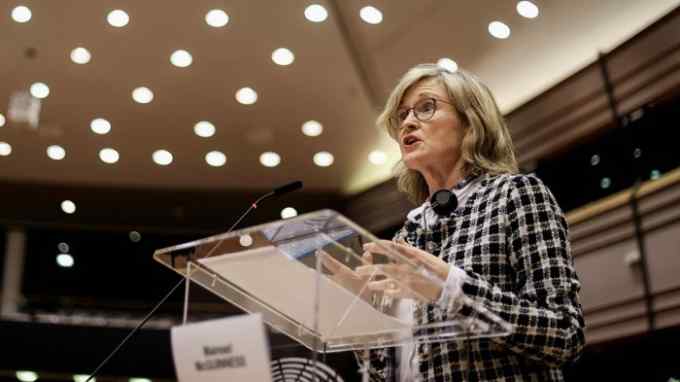Future of the City: how London’s reach will shrink after Brexit

Roula Khalaf, Editor of the FT, selects her favourite stories in this weekly newsletter.
This article is the first in a series on the Future of the City of London
In the summer of 1962, a City of London banker wrote to Lord Cromer, the governor of the Bank of England, about a “certain exchange of ideas” that was taking place among well-connected individuals in Britain’s financial capital.
Sir George Bolton was not among the best known names in British finance. A former BoE official, he chaired the Bank of London and South America, a subsidiary of Lloyds Bank whose late 19th-century heyday had long gone.
But he was a visionary who had grasped that the City’s revival as a financial centre depended on a bold strategic change.


Instead of eking out an increasingly moth-eaten living financing the dwindling proportion of global trade that was still denominated in sterling, Bolton felt the future lay in opening up London as a hub for loans in foreign currencies.
The prize was there to be grasped. Postwar reconstruction was hampered by a shortage of capital. Its cause, he had told London’s Overseas Bankers Club the previous year, was “the persistence of exchange controls, the restriction over the movements of people and the consequent granulation of Europe’s capital and human resources into isolated jealous particles”.
If capital could once more flow freely, Bolton thought, London, with its expertise and traditions, would be a massive beneficiary.
“Conversations so far have been kept within the very small group of representatives of Barings, Samuel Montagu, Warburgs and ourselves,” he wrote to Cromer of the other banks involved. “But we would not wish to proceed more actively unless the ideas have the general blessing of the authorities.”
When he responded a fortnight later, the governor noted a few practical tax and legal difficulties. But, otherwise, Cromer signalled his support.

An offshore financial playground
Bolton deserves to be remembered as one of the architects of the City’s postwar resurgence. His idea — conjuring a debt market from the pool of so-called “eurodollar” deposits that had accumulated offshore in the hands of European institutions — finally took wing in 1963.
Concerned about a widening balance of payments deficit, the US government imposed a withholding tax designed to stem the flow of dollars abroad, and inadvertently breathed life into what became the eurobond market.
By 1970, from a standing start, issuance was running at $45bn annually, four-fifths of it arranged out of London. In the same year, by contrast, the whole London Stock Exchange raised just $240m.
This offshore financial playground — where money was lent and borrowed in different currencies beyond the reach of their national authorities — was the first step in what is sometimes called the “Wimbledonisation” of the City after the famous tennis tournament. London provided the venue and the rules, but the players and cash could come from anywhere.
Future of the City
In a series of articles, the FT examines how London's financial centre will fare in the decades ahead as Brexit negotiations reach their climax.
Receive alerts when a new part of this series is published by adding 'London fights for its future' to myFT
It has been a game at which London has excelled in an era of financial deregulation. Over the past 60 years, the City has shrugged off the limitations of the UK economy and the decline of sterling as a reserve currency, absorbing much of the EU’s capital markets and vying with New York for the title of the world’s premier financial centre. It has surmounted scandals and growing unease about inequality and weathered the brief bout of deglobalisation that followed the financial crisis of 2008.
Yet this pre-eminence is now threatened neither by external crises nor mis-regulation, but by a self-inflicted geopolitical shift that threatens to reverse the general trend towards greater openness that has existed since Bolton’s day: Britain’s looming departure from the EU. The country’s final ties with the bloc are set to be severed on January 1.
Research from 2016 by the consultants Oliver Wyman shows why the prospect of Brexit worries London financial bosses. Only half the City’s wholesale business came from UK customers. Of the remainder, roughly half came from the EU. The rest emanated in the wider financial world, from the US to the Middle East and Asia.
“It is hard to read Brexit as a positive for the City of London if you peer forward 20 years into the future,” says Philip Augar, the former banker turned author. “It may not be a catastrophe, but it will place restrictions and frictions where there were none before.” For the first time since the 1960s, the City’s reach will shrink.

EU seeking ‘economic autonomy’
For the financial sector, much of the focus since the 2016 referendum has been on the consequences of the imminent loss of the “passport rights” UK-based firms enjoyed in trading with EU customers.
Despite early warnings of mass departures and movement of business lines, the impact has been limited. “The main aim for most has just been to ensure continuity of business after Brexit while making sure you stay within the law,” says John Liver, an expert in financial services regulation at accountancy firm EY.
About 10,000 City jobs — 4 per cent of the total — have either been shifted to various EU centres, or been displaced by firms choosing to add new roles there rather than London, according to an EY survey. That’s a far cry from the 232,000 estimated in a London Stock Exchange survey in 2016, although more are expected.
More substantial is the moving of banking assets — mostly to Frankfurt. About £1.2tn, or 14 per cent, has moved since 2016. “Where assets end up tends to be where in the long run activity follows,” says one London-based foreign banker. On Tuesday the Commonwealth Bank of Australia announced it would open a new European HQ in Amsterdam.
Looking beyond the short-term disruption, however, many believe that Brexit is likely to mark a much more profound change.
“The City has benefited for the past half century from being both an onshore and offshore financial centre,” says Nicolas Véron, senior fellow at the Peterson Institute in Washington.
Both of these sides fed off each other, creating a “virtuous” dynamic. So when European integration permitted the City to expand its onshore domestic market into the EU’s fragmented capital markets, London’s massive offshore business helped it dominate them. Meanwhile, that same powerful European position helped to create a deep pool of liquidity sucking in trade from round the world.
Mr Véron believes that Brexit could disrupt this model. “What happens from January 1 is that the City moves offshore from the EU,” he says. So instead of having three-quarters of its wholesale business onshore, London will move to a position where it is roughly 50-50.
If the City loses EU trade as a result of Brexit, the economics of doing business in London may themselves be altered, causing other offshore financial activities to scatter — not just to the EU but to other financial centres such as New York. Mr Véron likens the City’s various business lines to a series of “Jenga towers” where the whole structure can unexpectedly topple if you pull out the wrong brick.
“The City is full of large international banks, especially American, which are very rational about centralising business where there are the biggest synergies,” he says.

Adding sand to the machinery
Few doubt that the City will remain a major financial centre for the foreseeable future, as well as by far the largest hub in the European timezone.
Research by New Financial, a think-tank, shows that in some sectors, London accounts for a crushing share of EU business. Over the three years to 2019, for instance, it was responsible for 84 per cent of the top three EU countries for derivatives trading, 82 per cent for foreign exchange and 42 per cent of assets under management.
While the EU talks about restoring its “economic autonomy”, achieving this will be difficult, especially in areas where the withdrawal of access might damage the EU’s own financial stability. This is why, for instance, Brussels has agreed to roll over current arrangements for clearing euro-denominated derivatives, a business dominated by London-based clearing houses.
“This is not the work of a moment,” says Sébastien Raspiller, assistant secretary for the financial sector at the French Treasury. “We are talking about loosening very deep ties with the UK.”
It will be hampered in the near term by the unlikelihood of finance coalescing around a single EU hub, and the still under-developed state of the bloc’s capital markets. Post-Brexit these will represent just 87 per cent of EU27 gross domestic product as opposed to 171 per cent in the UK, according to New Financial, emphasising the bloc’s reliance on its less-than-vibrant banks for finance.
English law remains the global lingua franca for international contracts and its courts the hub for dispute resolution. “The skillset is in London for a reason,” says Hans-Jörg Rudloff, a banker who in the 1980s was known as “the king of the Euromarkets”. “It is open, hospitable and a great place to live.”
But the City should not mistake the determination of the EU to erode the UK’s dominance. “The EU will fight tooth and nail to claw back the financial business it lost to London,” says Mr Augar, who believes it “will succeed to some extent by virtue of such things as regulatory arbitrage and capital bias”.
In some cases this may be achieved by fiat. Banks can, for instance, be compelled by their supervisors to clear financial transactions on EU territory. But the European authorities can also influence locations more subtly by inserting regulatory sand into the financial machinery.
“You make it more costly and boring for people to organise things the way they want to, like EU wholesale funds delegating the management of those funds to London fund managers,” says one regulatory expert. “You don’t have to ban it. It’s like eroding a coastline. Roll forward for 10-20 years and most people have fallen into line.”

‘Patience as well as expertise’
In 2017, Mark Carney, the then BoE governor, sketched out a post-Brexit vision for the City in which it maintained its market share of cross-border business over the next quarter century. The UK’s financial system would not then be 10 times the size of its GDP, as now, but “15 to 20 times GDP” Mr Carney suggested.
“Well then [the authorities] will really have to hold [their] nerve and keep the focus,” he said.
Mr Carney’s point was to explain why, in the light of its 2008 experience, the UK would be unwise to deregulate its markets aggressively in a bid to attract new international business after Brexit. But it also raised a bigger question: how feasible was it to achieve what Mr Carney called “the plan” for the City to keep growing in line with global flows.
One challenge for the UK is that its domestic and neighbouring European markets are shrinking proportionately in global importance. Since 2006, the EU27 have seen their share of global financial activity fall from 20 per cent to just 13 per cent, according to New Financial. Asia now accounts for 40 per cent and is growing far more quickly. It is far from clear that in this new world, capital will flow down the same global channels it has in the past.
Financiers are casting around for new fast-growing business lines which they can add to London’s globally competitive ones, such as foreign exchange and derivatives. One idea is that London could be a centre for green or sustainable finance. Another is that it could become a hub for the “fintech” digital revolution.
The dominant City
31.7%
The UK’s average share of total EU capital markets activity in the three years to 2019 (Source: New Financial report: ‘What do EU capital markets look like on the other side of Brexit?’)
48%
The UK’s share of global derivatives trading in the three years to 2019. For the EU27 it was 6%. For FX trading, the UK’s share was 43% and the EU’s 8% (Source: New Financial)
£40bn-£50bn
of the UK’s estimated £200bn in financial services revenues was from international and wholesale business related to the EU (Source: Oliver Wyman, 2015 figures)
William Wright, head of New Financial, believes that London could flourish by teaming up on a case-by-case basis with one of three giant blocs — the US, Europe and Asia — to help turn what would otherwise be a regional initiative into a de facto global standard. “You could see something like that happening with, say, green finance,” he says. “London allying its capital and expertise to the EU’s framework on ethical finance.”
Whatever barriers are raised by other countries, London is likely to keep its own doors open. Rishi Sunak, the UK chancellor, has already granted the EU access to UK markets, despite a lack of reciprocation on Brussels’ part.
“Openness is hard wired into the UK’s view of the financial world,” says Paul Tucker, a former deputy governor of the BoE, who believes this is enlightened self-interest.
Rather than trying to pick the growth sectors of the future, he thinks the best strategy for London would be to stick to the basics. “An open centre beyond compare for stability and integrity, with outstanding financial plumbing, would be set to benefit when others eventually make mistakes, and would help minimise the downside in the meantime,” he says. “It means steadfastly avoiding the temptations of light touch regulation and softer prudential standards, and so requires patience as well as expertise.”
Whether that would deliver a larger or smaller City in the long run is unclear. When Bolton conjured the Euromarkets in the 1960s, a world girded with tight national controls that starved many countries of capital could see the virtue of loosening some of those restrictions to secure those badly needed funds. Today almost the reverse is true. Funds flow so easily that many would rather seal their frontiers a little more tightly to secure more control.
Not everyone thinks it would be a bad thing if the City were smaller. “I think we forget how alien London’s extreme wealth appears to the rest of the country, and the social and efficiency problems caused by pricing people out of housing and diverting so many talented people into financial careers,” says Sir Paul. “It might be healthy for the UK if London was less dominant.”
Looking ahead, Mr Véron thinks the headwinds for the City will be stronger. “When the City made its leap forward in the 1960s, there really was a crying need for that financial revolution. In the modern global markets is there scope for something as dramatic? Not so much.”

Comments